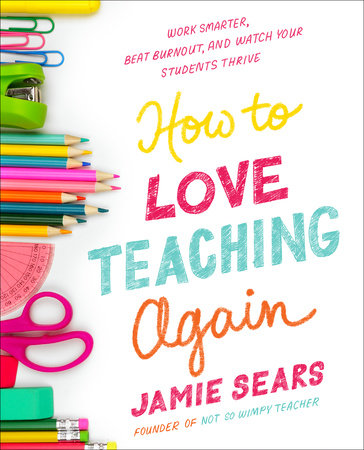Chapter one
The Standards for Being
a Great Teacher
When I was a student teacher, I taught twelfth-grade government. Or so I thought.
W
I had 150 students in total. Every time I gave an exam, one-fourth would fail. As a former lobbyist and always perfectionist, I was dumbfounded. I had given my students solid lessons, great notes, and a super resourceful study guide.
But thirty-seven kids still flunked every unit test I gave. As I made red mark after red mark, I beat myself up about what a terrible student teacher I was and how no school would ever hire me. Yup, I am pretty dramatic. The teacher who was mentoring me at the time-one of my favorite teachers from high school-told me to be patient with myself. He didn't seem worried in the least. And you know what? Every single one of those 150 students passed the course and graduated. Despite failing my unit tests. Many went to college and I hope all of them learned enough in my class to understand the importance of voting. (Please vote.)
But what I learned through that experience is that my classroom-and yours-isn't the last place your students will learn. About math, English, social studies, government, and life. Our educational journey is long. There are tough times for every student along the way. What I want you to realize and remember is that your classroom is not the final destination. You are just one stop on every student's educational journey. The kids in your class get to make other stops along the way. Each stop-from first grade to sixth grade to twelfth grade and beyond-is another opportunity for a new adventure and lessons learned.
So-deep breath here-it is perfectly okay if every student does not meet and exceed each testing standard while in your classroom. Yup, I said it. Every kid isn't the same. An entire class of kids can't all learn and grow at the same pace, and therefore, every student won't end at the same place at the end of this school year. Those who wrote the standards might not know this, but you and I are smart cookies. We know with certainty that every kid in our classroom, regardless of current grade-or reading!-level, will have a different experience with their education.
We're taught that students' overall education is the goal when we learn to teach, but in practice it's easy to forget and lose perspective. It can be so tempting to base our self-worth as teachers on student test scores. A few kids don't pass their math-facts test and suddenly you are spiraling in despair about what a terrible teacher you are.
If you are doing this right now, take a breath. You are not alone. I did it too. Teachers face so much pressure for their students to perform on tests when, really, standardized testing is just one data point and can be irrelevant to the quality of teaching that is actually happening in the classroom.
You love your students. You want them to succeed. But their success is not the definition of being a great teacher. Think back to your favorite teacher from school. Did you like them because you always got As on their tests? I doubt that's the reason you still fondly think of them as a great teacher. Instead, I bet you loved that teacher because of how they made you feel, how they spoke to you, what they believed or noticed about you that others didn't.
My mentor teacher when I was student teaching was actually my government teacher in high school. Mr. Craig was one of my all-time favorite teachers because he talked to me like I was brilliant. He treated me like an adult and believed I was capable of succeeding at hard things. That's why my definition of a great teacher is listening to, believing in, and pushing your students. It's not about having the best test scores in your district.
I wanted to be a great teacher. I knew that from the moment I made it Facebook official that I was going back to school to become a teacher. However, even though I knew in my heart that I could be a great teacher, I had my doubts. I kept hearing my cousin's words in my head. "You can't be a great teacher and a great mom. You'll suck at one of them." I just had to prove her wrong, even if I didn't know quite how to make it happen.
When teachers in the Not So Wimpy Teacher Facebook groups post about feeling like bad teachers, it reminds me of marshmallows. That seems weird, right? But I promise-it'll make sense after I share a story. Before I got married, my mom threw me a bridal shower and invited lots of her friends. None of my friends came because we were all broke college students at the time, and it was hard enough for us to scrounge up gas money, much less gravy boats and china. Driving to my mom's house on the day of the shower, I felt grateful for the generosity of my mom and her friends, and excited for the actual party. And it was fabulous. Except for the games.
There was one game in particular I will never forget. Prior to my bridal shower, my mom asked Scott some questions about himself. Then, at the bridal shower, she asked me the same questions. If I got the question right, we went on to the next question. But if I got it wrong, I had to put a giant marshmallow in my mouth. I wasn't allowed to chew it or swallow it. I just had to keep it in my mouth until the end of the game.
My mom started asking questions, and it became apparent very quickly that I had been set up. To this day I don't know if it was my mom, or Scott, or if they were in on it together . . . but I got every question wrong. Even the ones I knew for sure-like what size shoes Scott wore. I mean, I bought his shoes! I was sure I had the right answer. But another marshmallow was added to my mouth.
It went on and on like this. I knew all the answers. But every answer Scott had given was inaccurate. It didn't matter, though, because according to the rules of the game I had to keep adding marshmallows to my mouth while all her friends laughed hysterically. I ended up with a mouth full of massive marshmallows. It was awful. And it was hard for me to breathe. By the end of the game, I was gagging and couldn't even answer the questions because of the marshmallows.
To this day I can't even think about marshmallows without feeling nauseated.
Teaching is a lot like having a mouth full of marshmallows. When you first graduate from college, you have just one marshmallow. It's sweet and delicious. You love it so much. You are so excited about your career path and spend lots of time dreaming about the lives you will impact in your super-fun, totally cute classroom.
Then you get your first job and another marshmallow is added. You're excited, but also nervous. You have so many decisions to make. What should you buy? How should you set up your classroom? Should you have themes? Next, there are professional development and staff meetings on your schedule. Marshmallows are now being added two at a time. You have to learn standards, and a new curriculum is thrown at you. It's starting to get hard to breathe. Every day, more is added to your load.
And that analogy is true for all teachers. Seasoned teachers come to school with a mouth full of marshmallows but continue to try to squeeze in more than can comfortably fit. Teaching becomes like shoving more marshmallows into your mouth than you can hold without gagging. You're being asked to join committees and clubs and to volunteer to coach sports teams. As soon as you figure the curriculum out, a new one is introduced. The pressure is always on to come up with more engaging and differentiated ways to teach the lessons. And just when you think you can't fit one more marshmallow in, you are assigned a student teacher and asked to mentor them. Does that sound about right?
The truth is that there is a tremendous cost to letting those marshmallows pile up. One Not So Wimpy Teacher, Alyse, had a powerful wake-up moment. Alyse used to work all weekend prepping for the week. One Saturday, her husband stood between her and her computer and said, with tears, "I miss my wife." She didn't realize how bad things had gotten. When she decided to reserve weekends for family, she learned she was doing too much for school and not enough for home. And guess what? Even though she wasn't working around the clock for her students, they still loved her.
As teachers, most of us know we are gagging and struggling to breathe. So why do we keep adding more to our plate? It's simple. We do it because we want to be great teachers for our students. It's all we have ever wanted and the reason we chose this career path. But does all that overwhelm, all those marshmallows, make for a great teacher? And what is a great teacher, anyway?
When I first started teaching, I didn't really know what a great teacher was. I was watching the other teachers around me and looking to them for guidance. I started to follow teachers on social media. They became my mentors. Without even realizing it, I had defined in my mind what being a good teacher meant.
And like a lot of the people I talk to online-and maybe you too-I couldn't ever live up to the image I had crafted in my mind because I believed three huge myths about being a good teacher. After working with tens of thousands of teachers, I now know that most teachers have believed at least one of these myths at some point in their career-and have felt like they were never good enough as a result.
Myth #1 • Good Teachers Work
Long Hours.
The good teacher arrives at school early and is the first in line at the copy machine.
Their car is the last in the parking lot at night.
It's dark by the time they leave.
When they leave school, the good teacher has the largest bag and it is always stuffed full with papers to grade and lesson plans to complete.
The good teacher spends a good chunk of their weekend preparing amazing lessons for the following week.
The good teacher almost always drops by the school on their day off.
Good teachers are willing to put in any number of hours necessary to help their students succeed. That's just what good teachers do.
The teachers I admired the most during my first years on the job always beat me to school in the morning. Most took so much work home that a bag wouldn't do. Instead, the teachers I was trying to emulate had carts with wheels to drag work home with them. These teachers were always signing up to lead committees, coach teams, sit in on interviews, and volunteer for parent-teacher-night activities.
I've heard horror stories about what teachers do in order to get all their work done. One member of our Not So Wimpy Teacher Facebook group admitted to sleeping in her classroom a couple nights a week. Another teacher used to stay at school so late that she had to use the fire escape to leave because otherwise she would set off the alarm.
Like a lot of my fellow teachers, I too started to believe that if I wanted success in the classroom, I was going to have to put in significantly more hours. If you've ever thought, "I need to find a way to sleep less and work more," then you may believe the myth that good teachers have to work long hours and dedicate their whole lives to their jobs, like I did.
But here's the thing-can you think of a teacher you know who gets great results in the classroom and has amazing relationships with their students but does not work on weekends?
I can. The teacher who taught next door to me used to leave every day at her contracted time (or even slightly before). She set boundaries for when parents could contact her. She didn't do a lot of over-the-top activities. She focused on building relationships with her students. She didn't grade everything. Yet her students experienced a lot of growth and parents loved her. Teachers like her prove that working on weekends isn't mandatory to be a great teacher.
Similarly, can you think of a teacher who works all hours but still struggles to make her lessons effective and meet the needs of her students?
I can-because she was in my classroom. (Spoiler alert: it was me!)
When I first started teaching, I was spending my time doing all the wrong things. I was creating brand-new center activities for every week, putting cute covers on all my binders, and printing free resources from Pinterest that I would never have time to use. I was working a lot of hours, but the tasks I chose to complete did not always help me or my students to be more successful.
But here's the truth.
You can be an amazing teacher and work a reasonable number of hours.
You can also work a ton of hours and not get the results you desire. In the end, what you do with your time matters more than the number of hours you work.
My point is, there is no relationship between good teachers and time spent teaching.
Myth #2 • If You Do More, You'll Be a
Good Teacher.
A good teacher is always bringing new and innovative activities to the classroom.
A good teacher does science projects and even art projects that involve paint and glitter.
Good teachers do full-on room transformations for math. Good teachers spread out a variety of perfectly appropriate books and allow kids to read the first chapters in an arrangement that looks super cute for reading. Good teachers always switch out their bulletin boards and create anchor charts with hand lettering that looks borderline professional. Good teachers have time to do social and emotional learning lessons as well as music appreciation.
I don't know about you, but the teachers I admired on social media were always doing something amazing in their classroom. Their lessons all looked picture-perfect and involved an elaborate amount of supplies. It seemed that they were always doing something new.
Copyright © 2023 by Jamie Sears. All rights reserved. No part of this excerpt may be reproduced or reprinted without permission in writing from the publisher.







